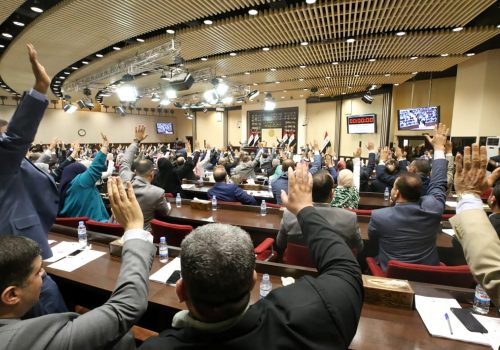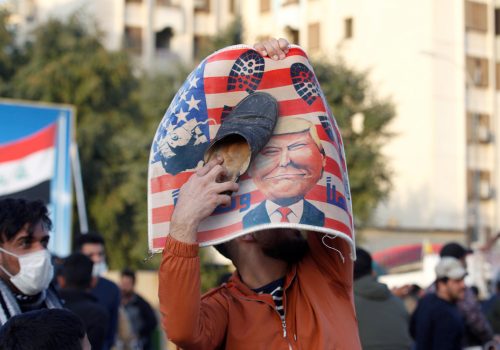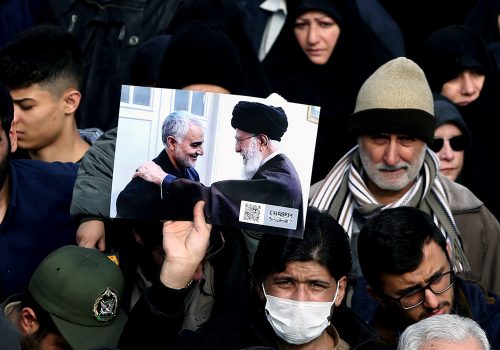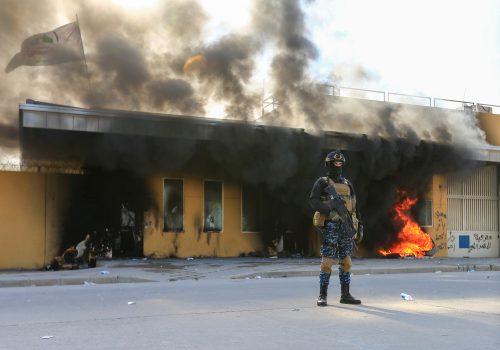The assassination of Qasem Soleimani: Likely consequences
The first casualty of the assassination of Iranian general Qasem Soleimani is diplomacy. Specifically, the prospects of an American-Iranian dialogue to lessen tensions, define regional red lines and return to the negotiating table on the Joint Comprehensive Plan of Action (JCPOA) nuclear agreement are now dimmer than they have been since 2016. By signing off on this action, no doubt a choice made by US President Donald J. Trump from a menu of possible military actions presented to him by the National Security Council in the wake of the siege of the US embassy by Kataeb Hezbollah (KH) and the Popular Mobilization Forces (PMF). What follows will be, by any other name, violent and escalatory.
Reactions inside the highly polarized political scene in the US have predictably split between Democrats and Republicans—no one mourning Soleimani the person, but Democrats warning that the assassination will decrease rather than increase the security of all Americans in the volatile region of the Middle East. Inside Iran, while a response on the ground is still being studied, early high-level statements have warned of dire consequences and a vengeful response from Iran.
Iran may not choose to set off a region-wide war at this point, but regardless of what response they choose to make will no doubt lead to a spiral of actions and reactions that make a wider war much more likely than it has thus far been. Here are some potential options for Iran:
- Coordinating a return to the siege of the US embassy in Baghdad, but this time with fully armed KH fighters, capable of breaching the walls of the main compound and perhaps taking over the embassy.
- An attack on the American base in Iraq, and a total confrontation with the several thousand troops around Iraq.
- An attack by rockets on US troops recently deployed in southern Saudi Arabia, close to the borders with Yemen.
- An attempt to assassinate an American official of similar rank and importance to Soleimani.
For Iran, the path of least risk would be to retaliate through a proxy, most likely inside Iraq. Lebanese Hezbollah is not likely to involve Lebanon in another war with Israel which would not serve the purpose of avenging the death of Soleimani. Yemen’s Houthis, though now on an escalatory path of their own with Saudi Arabia, are also not likely to willingly engage American forces poised across their northern borders—though if those forces take action against them they would find it hard not to respond in kind.
The second casualty is a peaceful and potentially constructive role for the US In Iraq. This recent flare-up comes at a time when large protests led to the resignation of Iraqi Prime Minister Adil Abdul-Mahdi, as Iraqi leaders try to orchestrate a careful response to the mass demonstrations the country has seen over several months. The assassination puts the country on a more perilous track and complicates the search for a serious reform plan as demanded by protesters. Iraqi parliament will now seriously consider legislation to demand the evacuation of all US forces from Iraq and, although public opinion had recently swung against the US, there will be serious disagreements on the future of US-Iraqi relations, both inside and outside government circles.
The demise of Qasem Soleimani the man and the military leader will leave a void, if only a temporary one, in the Iran axis in the region. Despite his special charisma and value as a strategist, Iran’s ministry of defense and the Islamic Revolutionary Guard Corps (IRGC) itself are institutions with some depth in terms of fully trained officers who can replace if not immediately fill the shoes of Soleimani. Regionally, this places Hassan Nasrallah and Lebanese Hezbollah in an even larger role within the Iran axis.
Nasrallah emerged as a regional leader of stature after leading the resistance to Israeli occupation—an occupation that ended in 2000 with the withdrawal of Israeli forces from south Lebanon. Iran has since then often relied on Nasrallah’s advice on Iraqi events due to the respect Shia leaders in particular have for him. Muqtada el-Sadr in particular has long looked up to Hassan Nasrallah, as has Houthi leader Abdelmalek al-Houthi. With the absence of Qasem Soleimani, Nasrallah becomes increasingly the man to look to for strategic advice from Shia movements in the region.
There is no doubt that Qasem Soleimani was a ruthless leader, not loathe to jump into the violent suppression of dissent as evident by his role in Syria in recent years and his support for anti-American forces in Iraq. However, he was also a pragmatist who understood the limits of Iranian power and the dangerous consequences of the use of force generally. His death does not eliminate the threat of terrorism or anti-American attacks in an already turbulent region, rather it only raises the temperature and the stakes of US-Iran confrontations. As an immediate consequence of the assassination, the presence of American diplomats in the region has become increasingly precarious.
Nabeel Khoury is nonresident senior fellow at the Atlantic Council’s Rafik Hariri Center for the Middle East.
Related Content
Image: Demonstrators attend a protest against the assassination of the Iranian Major-General Qassem Soleimani, head of the elite Quds Force, and Iraqi militia commander Abu Mahdi al-Muhandis who were killed in an air strike in Baghdad airport, in Tehran, Iran January 3, 2020. WANA (West Asia News Agency)/Nazanin Tabatabaee via REUTERS



